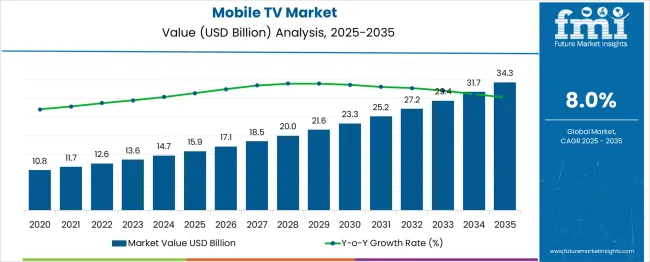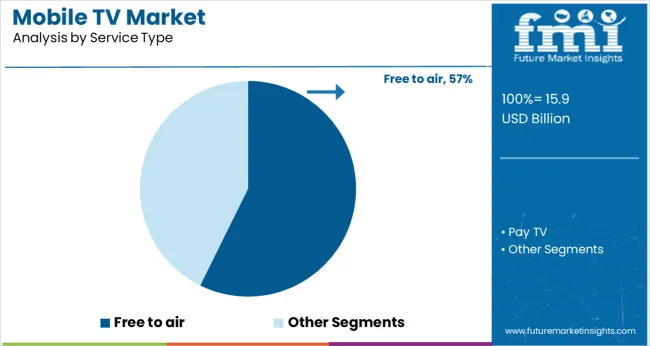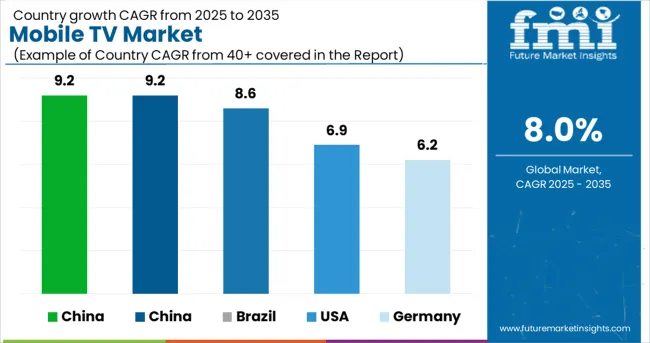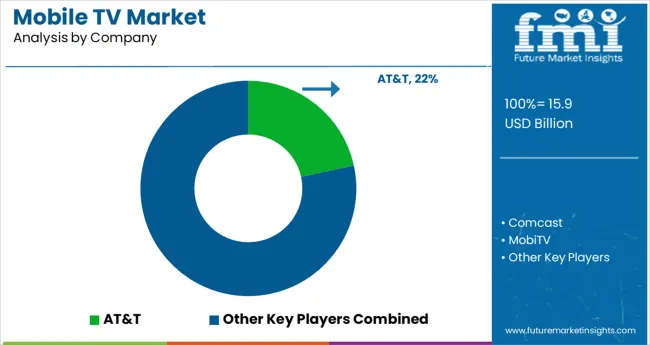The Mobile TV Market is estimated to be valued at USD 15.9 billion in 2025 and is projected to reach USD 34.3 billion by 2035, registering a compound annual growth rate (CAGR) of 8.0% over the forecast period.

The mobile TV market has experienced dynamic growth in recent years, driven by the widespread penetration of smartphones, advancements in high-speed mobile networks, and increased consumption of on-demand video content. As consumers increasingly seek flexible and convenient access to live broadcasts, entertainment, and news services while on the move, mobile TV platforms have rapidly expanded their reach across both developed and emerging markets.
Technological innovations such as 5G connectivity, improved video compression, and integrated streaming applications within mobile operating systems have further enhanced the accessibility and quality of mobile TV services. The market outlook remains optimistic, with growing collaborations between content providers, telecom operators, and digital platforms expected to fuel new service models, including subscription-based and ad-supported offerings.
Additionally, rising demand for localized, multilingual, and event-based live content is anticipated to strengthen the adoption of mobile TV solutions. As consumers continue to shift viewing preferences away from traditional television toward personalized, mobile-first entertainment, the market is projected to sustain consistent growth, supported by improved infrastructure and evolving media consumption behaviors.
The market is segmented by Service Type and region. By Service Type, the market is divided into Free to air and Pay TV. Regionally, the market is classified into North America, Latin America, Western Europe, Eastern Europe, Balkan & Baltic Countries, Russia & Belarus, Central Asia, East Asia, South Asia & Pacific, and the Middle East & Africa.

The free to air segment accounted for an estimated 57.3% of the total mobile TV market share, maintaining a dominant position within the service type category. Its popularity has been driven by the widespread availability of free, advertising-supported channels that deliver news, sports, and general entertainment content without requiring users to pay subscription fees.
This segment’s resilience is attributed to its ability to reach a broad audience base, particularly in price-sensitive markets and regions with limited access to high-speed internet services. The appeal of free to air services lies in their integration within public broadcasting networks and telecom partnerships, allowing users to access a wide range of live programming through mobile devices without incurring additional data or content charges.
The segment continues to benefit from strategic alliances between broadcasters and mobile operators aiming to expand audience engagement through digital platforms. Future growth prospects remain strong, as ongoing advancements in broadcast standards and mobile network infrastructure enhance the viewing experience, and as regulatory frameworks in several countries promote the availability of free to air services on mobile devices to support public information dissemination and cultural content distribution.
Additional features to existing satellite technology such as Wi-Fi or WiMAX, as well as terrestrial networks to send radio and wireless signals to deliver broadcasts by mobile TV contributes to the rising adoption of mobile TV worldwide.
The same caters to the mobile TV adoption trends as the user can use this service to view the most recent news, real-time traffic reports, and live telecasts of sporting events and television shows.
When compared to traditional cable television, mobile TV offers a higher quality and more customizable experience to the end user, and in turn, scales up the sales of mobile TV around the globe.
In addition, the introduction of 5G broadcast services is a factor that augurs well for the mobile TV market's future trends as 5G broadcasts provide users with high data speeds and media consumption capabilities, enhancing the overall mobile experience.
Other factors such as rising disposable income and consumer spending on leisure and entertainment activities are contributing to the mobile tv market trends in an extensive way.
Easy access and low installation costs are also expected to drive the demand for mobile TV even further.
Free-to-air and pay TV services are among the services provided by mobile TV market participants. During the forecast period, the share of the pay TV service segment is expected to grow exponentially. The pay TV segment is anticipated to lead the market with a CAGR of 8.3% from 2025 to 2035.
Pay TV services are projected to dominate the mobile TV market, accounting for more than half of the global market owing to the growing demand for premium content such as live sports, movies, and entertainment via video on demand (VoD) on local and regional channels.

| Regions | CAGR (2025 to 2035) |
|---|---|
| USA Market | 6.9% |
| Germany Market | 6.2% |
| China Market | 9.2% |
| Brazil Market | 8.6% |
| India Market | 9.2% |
During the forecast period, India and China's mobile TV markets are likely to hold sway over the rest of the countries with a CAGR of 9.2%.
In terms of revenue and mobile TV market share, India, and China are anticipated to hold the largest, and the market in this region is expected to grow further during the forecast period.
This can be attributed to the region's significant increase in increased investment in mobile networks, smartphone penetration, and surging mobile data subscriptions thereby favouring the mobile TV market statistics.
The increased investment in LTE networks, as well as the growing economic strength of emerging countries, are expected to be the primary driver of the mobile TV adoption trends in Brazil and South Africa.

Mobile TV market players are specifically entering the smart TV business, primarily targeting the Asian market, where the smart TV category is less mature than in North America and Europe.
Traditional TV brands such as Samsung, LG, and Sony have far more brand recognition and hold sway over the mobile TV market size in North America and Europe than newly-entered Chinese brands such as Xiaomi and OnePlus.
Chinese brands already dominate the mobile TV market trends and forecasts in China and India, and Xiaomi is the market leader in the Indian mobile TV market.
Xiaomi was among the first smartphone companies to enter the mobile TV market.
Xiaomi has already established itself as a value-for-money brand in the smartphone market, and it is capitalizing on that brand proposition to enter the mobile TV market at a time when mobile TV was out of reach for the majority of people, particularly in the Asian market.
Nonetheless, Xiaomi benefited from the first-mover advantage, capturing a 7% share of the global mobile TV market.
A few of the recent developments in the mobile TV market are as follows:
The global mobile tv market is estimated to be valued at USD 15.9 billion in 2025.
It is projected to reach USD 34.3 billion by 2035.
The market is expected to grow at a 8.0% CAGR between 2025 and 2035.
The key product types are free to air and pay tv.
segment is expected to dominate with a 0.0% industry share in 2025.






Our Research Products

The "Full Research Suite" delivers actionable market intel, deep dives on markets or technologies, so clients act faster, cut risk, and unlock growth.

The Leaderboard benchmarks and ranks top vendors, classifying them as Established Leaders, Leading Challengers, or Disruptors & Challengers.

Locates where complements amplify value and substitutes erode it, forecasting net impact by horizon

We deliver granular, decision-grade intel: market sizing, 5-year forecasts, pricing, adoption, usage, revenue, and operational KPIs—plus competitor tracking, regulation, and value chains—across 60 countries broadly.

Spot the shifts before they hit your P&L. We track inflection points, adoption curves, pricing moves, and ecosystem plays to show where demand is heading, why it is changing, and what to do next across high-growth markets and disruptive tech

Real-time reads of user behavior. We track shifting priorities, perceptions of today’s and next-gen services, and provider experience, then pace how fast tech moves from trial to adoption, blending buyer, consumer, and channel inputs with social signals (#WhySwitch, #UX).

Partner with our analyst team to build a custom report designed around your business priorities. From analysing market trends to assessing competitors or crafting bespoke datasets, we tailor insights to your needs.
Supplier Intelligence
Discovery & Profiling
Capacity & Footprint
Performance & Risk
Compliance & Governance
Commercial Readiness
Who Supplies Whom
Scorecards & Shortlists
Playbooks & Docs
Category Intelligence
Definition & Scope
Demand & Use Cases
Cost Drivers
Market Structure
Supply Chain Map
Trade & Policy
Operating Norms
Deliverables
Buyer Intelligence
Account Basics
Spend & Scope
Procurement Model
Vendor Requirements
Terms & Policies
Entry Strategy
Pain Points & Triggers
Outputs
Pricing Analysis
Benchmarks
Trends
Should-Cost
Indexation
Landed Cost
Commercial Terms
Deliverables
Brand Analysis
Positioning & Value Prop
Share & Presence
Customer Evidence
Go-to-Market
Digital & Reputation
Compliance & Trust
KPIs & Gaps
Outputs
Full Research Suite comprises of:
Market outlook & trends analysis
Interviews & case studies
Strategic recommendations
Vendor profiles & capabilities analysis
5-year forecasts
8 regions and 60+ country-level data splits
Market segment data splits
12 months of continuous data updates
DELIVERED AS:
PDF EXCEL ONLINE
Mobile Camping Toilet Market Size and Share Forecast Outlook 2025 to 2035
Mobile Phone Screen Underlayer Cushioning Material Market Size and Share Forecast Outlook 2025 to 2035
Mobile Application Store Market Size and Share Forecast Outlook 2025 to 2035
Mobile Money Market Forecast and Outlook 2025 to 2035
Mobile Application Testing Solution Market Size and Share Forecast Outlook 2025 to 2035
Mobile Cardiac Telemetry System Market Size and Share Forecast Outlook 2025 to 2035
Mobile Robots Market Size and Share Forecast Outlook 2025 to 2035
Mobile Crane Market Size and Share Forecast Outlook 2025 to 2035
Mobile Vascular Imaging Market Size and Share Forecast Outlook 2025 to 2035
Mobile Animal Inhalation Anesthesia Machine Market Size and Share Forecast Outlook 2025 to 2035
Mobile Unified Communications and Collaboration (UC&C) Solution Market Size and Share Forecast Outlook 2025 to 2035
Mobile Data Protection Market Size and Share Forecast Outlook 2025 to 2035
Mobile Medical Tablets Market Size and Share Forecast Outlook 2025 to 2035
Mobile WLAN Access Points Market Size and Share Forecast Outlook 2025 to 2035
Mobile Social Networks Market Size and Share Forecast Outlook 2025 to 2035
Mobile Printer Market Size and Share Forecast Outlook 2025 to 2035
Mobile Application Development Platform Market Size and Share Forecast Outlook 2025 to 2035
Mobile Threat Management Security Software Market Size and Share Forecast Outlook 2025 to 2035
Mobile Broadband Infrastructure Market Size and Share Forecast Outlook 2025 to 2035
Mobile Enterprise Application Development Platform Market Size and Share Forecast Outlook 2025 to 2035

Thank you!
You will receive an email from our Business Development Manager. Please be sure to check your SPAM/JUNK folder too.
Chat With
MaRIA